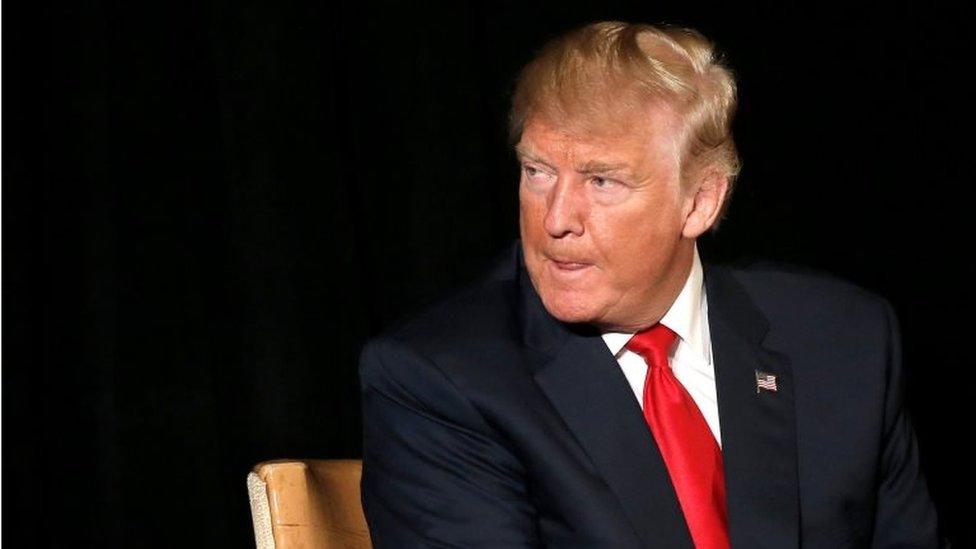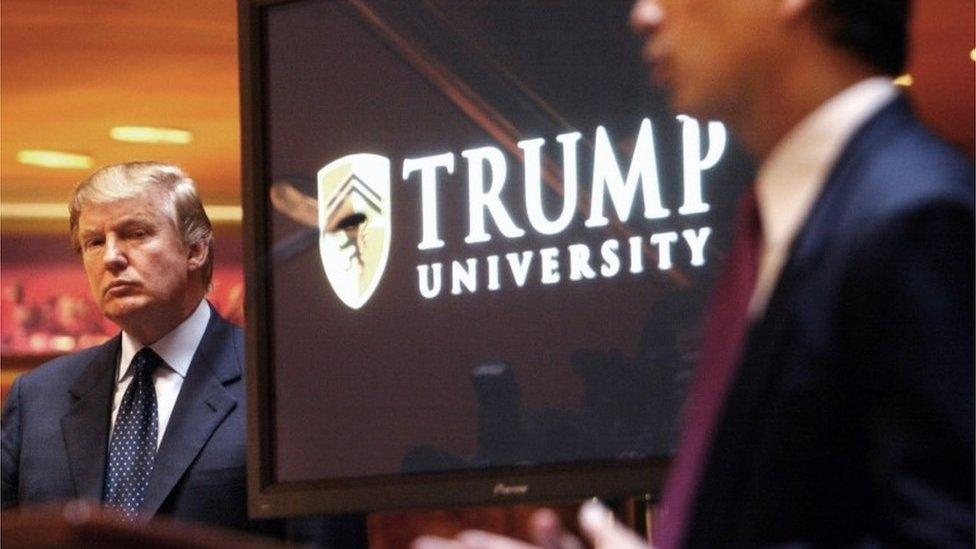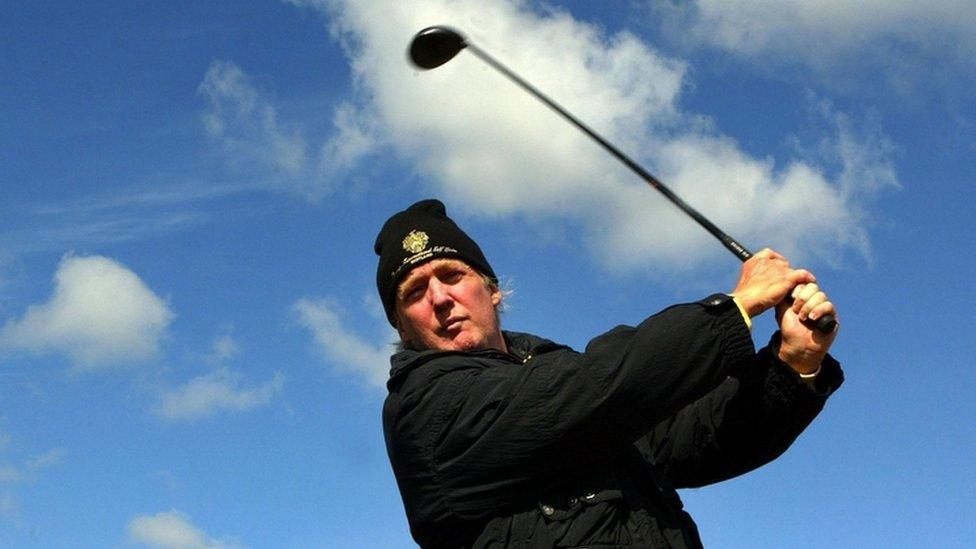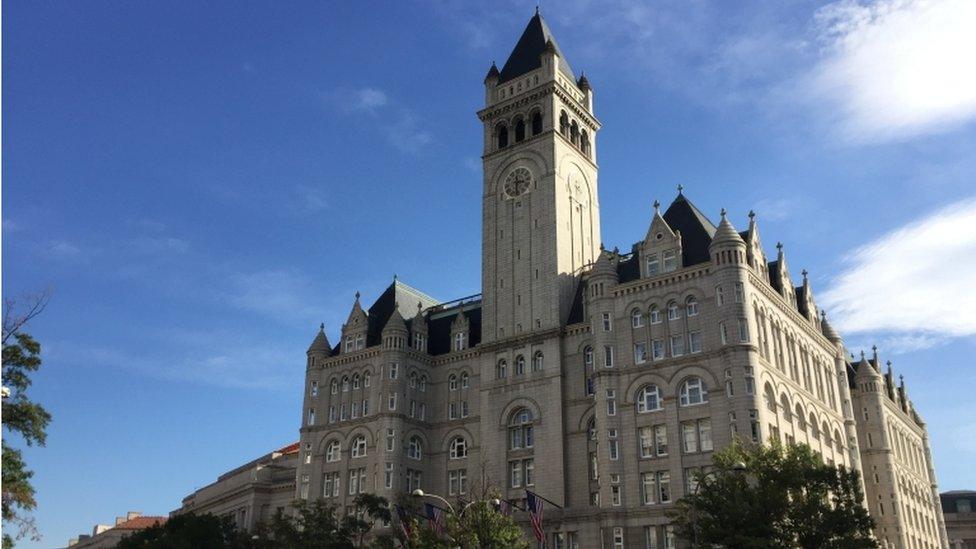Donald Trump's pending lawsuits and his presidency
- Published

Donald Trump is heading to the White House with numerous private lawsuits. What are they and how might they affect his presidency?
Even by the standards of billionaire businessmen, Donald Trump is an unusually litigious man who has been involved in thousands of lawsuits - both those he has launched and those he has defended - over the years.
The president-elect has been party to some 4,000 lawsuits over the last 30 years and is currently facing 75 active lawsuits, according to analysis by USA Today newspaper, external.
Mr Trump has settled arguably the most embarrassing three lawsuits - over the now-defunct Trump University - which centred on former students claiming they were charged tens of thousands of dollars for courses that promised to unlock the secrets of real estate entrepreneurship - and didn't.
He has always denied the claims but settled for $25m (£20m).
Trump University

Donald Trump at the launch of the Trump University investment school in 2005
Mr Trump faced three fraud cases related to Trump University, which closed in 2010.
The first case was set to being 20 days after the election, and had been brought by students who claim they were deceived by Trump University's marketing.
Mr Trump settled the class action lawsuit, closing all three cases, after repeatedly saying during his campaign that he would "never settle".
During his campaign, Mr Trump accused the judge, Gonzalo Curiel, of having "an inherent conflict of interest" because he was born to Mexican parents. He asserted that his campaign pledge to build a wall on the US-Mexico border and calling Mexicans "rapists", "murderers" and "criminals" would influence the judge's impartiality.
Mr Trump's lawyers had asked for the trial to be delayed until early next year, arguing he needs time to work on the transition to the presidency.
Libel, fees, sexual harassment

Mr Trump owns about a dozen golf courses around the world
Mr Trump's companies face open cases of fraud, unpaid bills, contract disputes and sexual discrimination in the 75 lawsuits, according to USA Today.
For example, members of Mr Trump's golf course in Jupiter, Florida, are suing the businessman for $2.4m for taking fees and dues while allegedly blocking admission to the actual club.
A former employee of the same club also brought a lawsuit last month, alleging she was unlawfully fired after reporting sexual harassment by a colleague.
Mr Trump is also defending lawsuits tied to his campaign. In New York State, Republican political consultant Cheryl Jacobus filed a $4 million libel lawsuit claiming he "destroyed her career" by calling her "a dummy" on Twitter.
In another case, scheduled for 29 November in Chicago, it is alleged Trump's campaign violated consumer protection laws by sending unsolicited text messages to "Help Make America Great Again!".
Celebrity chefs, women

The president-elect opened Trump International Hotel in the final weeks of his election campaign
One of Mr Trump's most high-profile lawsuits is against two celebrity chefs. He is suing Geoffrey Zakarian and Jose Andres after they backed out of a restaurant deal - at his recently opened luxury Trump hotel in Washington DC - over the president-elect's inflammatory statements about Mexican immigrants.
During the campaign, Mr Trump also threatened to sue all the women who have accused him of unwanted sexual advances, saying they were lying.
He also said he would sue the media, such as the New York Times, for printing the accusations.
Analysis of lawsuits by USA Today, external, however, shows Mr Tr ump rarely follows through with his threatened lawsuits and almost always loses when he does.
Taxes, Trump Foundation
Before the election, New York state attorney-general Eric Schneiderman said his office was investigating whether the Trump Foundation charity is complying with state law. Washington Post reporting showed that Trump solicited charitable donations without the proper approvals, and found evidence that Trump used foundation money in ways that could benefit him personally, which is against the law.
The Internal Revenue Service, meanwhile, is auditing Mr Trump's taxes, the president-elect has said. During the election campaign, the New York Times said it had received some of Mr Trump's tax documents and found that Trump had been in a position to avoid federal income taxes for 18 years, as permitted by taking current tax law.
While most of the ongoing cases are civil lawsuits, they could increase pressure on Mr Trump to release records. In cases that go to trial, he would have to sit for a deposition, during which he would be questioned under oath.